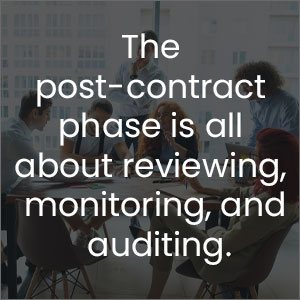This blog is the last of a three-part series on the phases of contract management processes. We started with the first blog discussing the pre-contract phase. Second, in the series, we dive into the contract development and contract award phases. The final of the three is the post-contract award phase. This final phase reviews compliance, follow-up, administration activities, and the overall management of the contracts.
For a complete step-by-step of the contracting process, read the Contract Management 101 eBook. It is a quick review of contract terms and conditions, and the phases from pre-award to contract completion. It identifies who needs contracts and why, defines an effective contract, as well as the impact of accords. Consider it a first-step guide for members of the general counsel’s office, contract administration, and contracting officers.
POST-CONTRACT PHASE
First, the parties have defined their needs, critical components, and key aspects of the agreement. Then, they outline the details. This was the pre-contract phase. Following that, an agreement was drafted, and the terms of the contract are clearly laid out. Finally, the parties negotiated, signed and settled the various details. Only after this does the third contract management phase comes into play – the post-contract phase. This begins once the parties have had their teams meet. Consequently, it is about performance monitoring, quality assurance, remedies, and keeping up contract documentation.
NEGOTIATING AFTER SIGNING
The post-contract phase is all about reviewing. monitoring and auditing. Following contract sign off comes the compliance and evaluation phase. Compliance teams need to ensure all conditions of the agreement are met for the quality expectations of both parties.
Now, just because a contract is signed off, does not mean all aspects are settled and negotiations end. In fact, there is often the need for changes resulting from unforeseen situations. This post-contract phase detailing, follow-up, and renegotiation, best explains the idea of contract lifecycle management (CLM). Also, some contracts stagnate after the deal. But, most active contracts become a ‘living – breathing’ item that meanders, changes, and evolves.
KEY ASPECTS: POST-CONTRACT AWARD PHASE
Aspects of the post-award phase of the agreement include:
- Contract administration
- Detailed contract audit
- Ongoing performance & status monitoring
- Penalties for delays, defects, breaches, and shortcomings
- Sudden contract end for breach, expiry, or other triggers
- Refinement of breach and termination definitions
- Claims & dispute resolution
- Final contract completion review
DON’T DISCOUNT THE AUDIT
A signed contract does not mean all aspects are settled and the negotiations end. Arguably, the ‘real’ work starts after the contract is negotiated and ratified. The post-contract phase is all about reviewing, monitoring, and auditing. An audit often starts with a re-look at the highest risk areas of the agreement, and work that needs to be done. Yes, it may sound boring. Yet, to the business, this can be very profitable. Research by the California Energy Commission on 2008 Energy Efficiency Standards, showed that contract compliance teams made a big impact. Having a solid governance program resulted in typical recoveries of 2-4% of the contract’s financial terms. The report goes on to cite some contracts with recoveries as high as 20% of the contracted terms.
For example, on a $2 Million agreement, a detailed contract audit will typically net out $40k – $80k in recovered costs or additional revenue. Better yet, sometimes it results in recovery as high as $400K. What may seem superficially boring, is of great interest to the CFO’s office!
Although the results are specific to the energy industry, they are indicative of how important the audit in the post-award phase can be.
WHY CONTRACT MANAGEMENT SOFTWARE?
After having reviewed the pre-contract, contracting, and post-contract phases, it is clear that there is much to do for the contracting process. Above all, doing an effective job in the best interest of the organization is about keeping a pulse on the active, living, breathing contracts.
When today’s organizations manage up to 40,000 active contracts, doing so without solid contract management processes and software – is just not possible. The simple case above showed that even small steps such as consistently performing post-contract phase audits can net significant results for an organization. Net wins like this are significant to truly showing the value of the office of the general counsel and legal operations team. So, it’s not just about costs… the teams help the company save and recover money!
MORE INFORMATION
If you are considering a change in your contract management process or structure – take a read of the Contract Management 101 eBook. It is an unbiased review and deeper dive into the critical aspects of the subject.
So, for a completely pressure-free discussion about contract lifecycle management (CLM) systems and how it can help your organization – contact us at ContractPodAi. We live for contracts, and love contract management. After all, our systems are designed by lawyers, for lawyers.
Author:

Manpreet Dhillon
Connect with us on Linkedin





